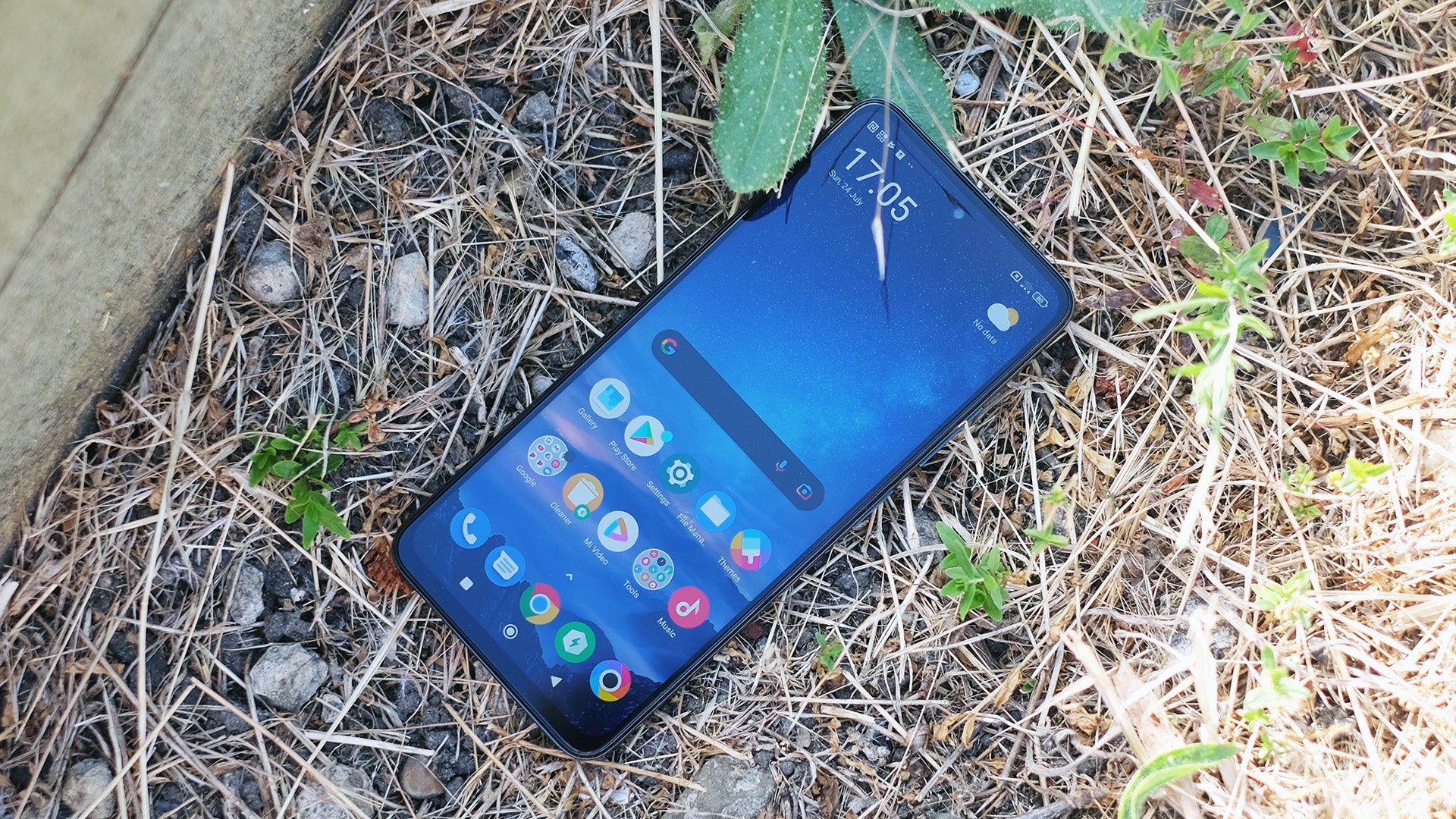Verdict
The Poco X4 GT is a powerful, great-value, if you can find it at the right price. And while its camera array isn’t killer, it can outperform some similarly priced, less powerful Android handsets.
Pros
- Fantastic raw performance for the money
- Fast charging, good battery life
- Fairly loud speakers
- Rich colour, high refresh rate screen
Cons
- Feels a bit cheap without the bundled case
- Low-light camera performance isn’t great
Availability
- UKTBC
- USAunavailable
- EuropeRRP: €379
- Canadaunavailable
- Australiaunavailable
Introduction
The Poco X4 GT is an affordable performance phone, one of the best available at the price for raw performance. It’s powered by a MediaTek 8100 CPU, which can compete with the Qualcomm Snapdragon 8 Gen 1 in most respects.
This phone’s battery life is strong, too – handy, if you intend on making proper of the power on tap.
Build quality isn’t anything special, though, and its cameras – while solid enough – aren’t a match for those of the Pixel 6a. You also miss out on a couple of flashier extras, such as good water resistance and an in-screen fingerprint scanner.
However, the Poco X4 GT is made for a specific audience, to a limited budget, and the team behind it appear to have managed priorities well here. I also think it’s a stronger phone than the Poco F4 GT, which becomes hot more readily, suffers from more pronounced throttling, and costs more, too.
Price and Availability
The Poco X4 GT is very similar to the Xiaomi Note 11T Pro, a phone that only appears to be available officially in China.
At the time of review, the Poco X4 GT’s pricing is all over the place because it isn’t stocked in any of the retailers I’d usually reference. Nevertheless, this review is based on the idea that you can pick up the base 8GB/128GB model for around £289.99 (379 euro)
At this price the Poco X4 GT represents a great deal, one that makes me less disappointed by the slight issues with the phone’s build and camera. However, for the £400 I’ve spotted it from some places, it’s a far less appealing proposition, since it pushes the Poco up to phones such as the Pixel 6a, Nothing Phone (1) and OnePlus Nord 2T.
Design and Screen
- Fairly chunky at 8.9mm thick
- Plastic rear feels a little cheap
- Plain and inoffensive design
Xiaomi, the company behind the Poco series of devices, has churned out an awful lot of phones in the £250-£400 price bracket over the past couple of years. They tend to represent excellent value, but their priorities differ.
Build and style aren’t top priorities in the Poco X4 GT. This is an all-plastic handset, bar the glass that covers the screen and cameras, and the metal side buttons. Without the case, the Poco X4 GT feels like a budget phone. Plus, the straight-walled sides do little to hide the substantial size of this phone – at 8.9mm thick, it’s chunky.
Thankfully, you won’t ruin the look or feel of the Poco X4 GT by using the supplied case, so that’s what I did a couple of days after first setting it up.
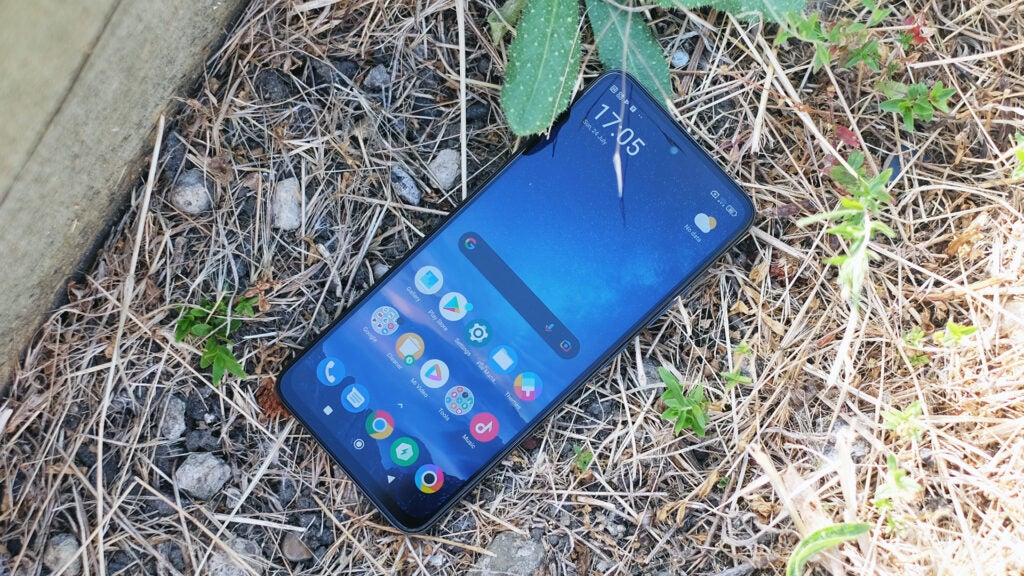
That said, there’s a restrained plainness to the Poco X4 GT that I prefer to the bolder appearance of some other Poco phones and close rivals such as the Realme GT Neo 3T. The Poco’s plastic rear finish looks a bit like matte glass, and the camera housing is good-looking enough. Cute, almost.
The fingerprint scanner sits on the phone’s side, not in the screen. This position is usually perceived as a lower-end style – but, importantly, it works just as well. This scanner is built into the power button, but you don’t even need to depress the button itself to wake up the Poco X4 GT.
Other hardware features here are just what I want to see in an affordable, somewhat gaming-focused Android phone. The Poco X4 GT has loud stereo speakers, which just lack the lower-frequency power of the best, and there’s a headphone jack up top.
There’s no expandable memory, which is a shame. The Poco X4 GT offers 128GB of storage, which is common across many Android handsets of this style. A 256GB option is available, too, for slightly more money.
The Poco X5 GT has a 6.6-inch screen with an unusually high maximum refresh rate of 144Hz. Plenty of rivals have 120Hz screens, but 144Hz? This gives the phone a more gamer flavour; but in practice, it makes very little difference. However, you can set the display to 90Hz as well as 60Hz.
High refresh rate phones can typically be set to either 60Hz or their “high” setting. Getting a mid-level option is a nice addition.
Colour reproduction is excellent, delivering basically no sense that you’re losing out here by not having an OLED panel. By that I mean the most vivid setting is too saturated for my own tastes.
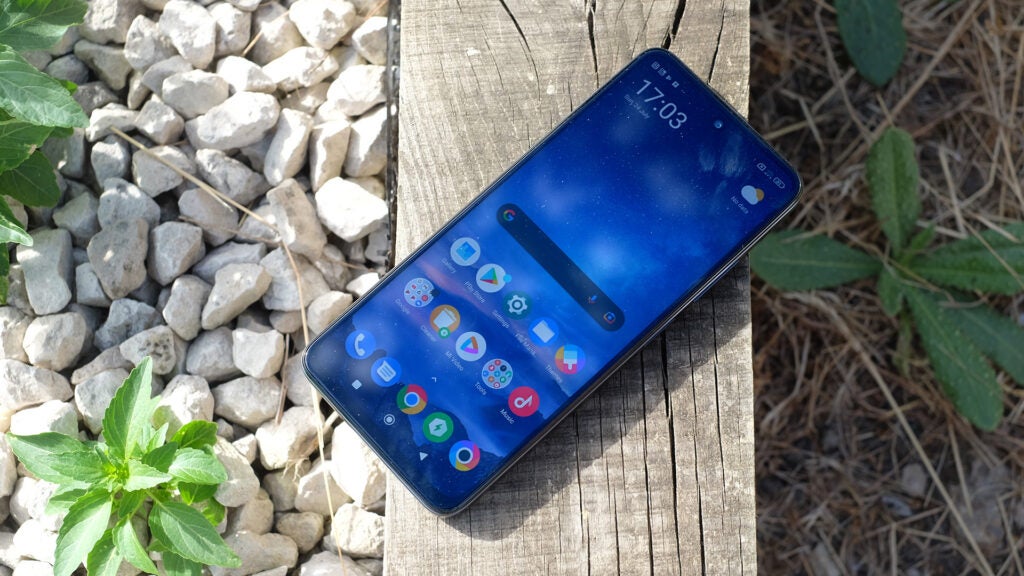
The fact that it’s LCD tech at play here becomes apparent in darker rooms, where you can make out the glow of the backlight in black parts of the display. It’s minor, though, and contrast is good for an LCD.
Brightness is one area I wish were slightly better. The Poco X4 GT can reach 490 nits normally, and in direct sunlight will ramp up to 570 nits. While this is okay, it’s far below the 770 nits of the Realme GT Neo 3T – that’s a phone that delivers unusually good outdoors visibility.
Supporting HDR content, the 2400 x 1080 pixel display looks sharp. You can get OLED panels for this money, but not in handsets with as much power as the Poco X4 GT. And, honestly, I don’t think you’re missing out on all that much with the LCD here.
Performance
- Some annoying MIUI quirks
- Excellent raw performance
- Great for gaming
The Poco X4 GT runs Android 12 with Xiaomi’s MIUI on top. This overwrites most of the big visual changes Google made in Android 12.
It remains a decent-looking interface, but like all of the recent Poco and Xiaomi phones I’ve used, there are some unwelcome changes to one element of navigation.
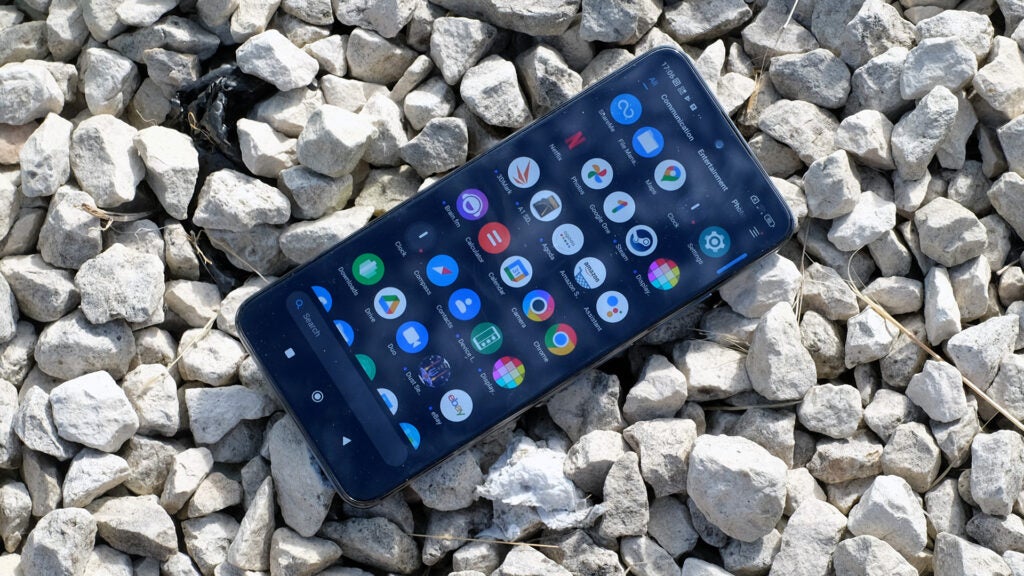
Performance is the main reason to buy the Poco X4 GT, since it’s powered by a MediaTek 8100 GPU. While not as big a name as the Qualcomm Snapdragon 8 Gen 1, for example, it performs at a comparable level – which is a great result for a phone at this price.
Compared to the Poco F4 with its Snapdragon 8 Gen 1, which scored 3687 (GeekBench 5) and 10,140 (3D Mark Wild Life test), the Poco X4 GT scored 3719 in Geekbench 5 and 5855 in 3DMark. That 3DMark score looks far better with the Snapdragon, but the Poco F4 suffers from far worse thermal throttling than the Poco X4 GT. Its actual performance lead is more like 30%, not almost 100%. At the price, the Poco X4 GT’s performance is excellent.
I tend to use Fortnite as an indicator of a phone’s gaming capabilities since it’s one of the platform’s more demanding games. This phone isn’t officially supported – a popup appears when you first run the phone.
That lack of official support means you can only run the game at its default “Medium” graphics. The menu also suggests 30fps is the maximum frame rate at which you can play. However, when I actually played a match the frame rate counter suggested it hit 100fps at points, generally hanging around the 60fps mark.
That’s significantly better than what you’ll achieve with most other phones around this price. It’s the sort of performance that made the early Poco phones such a hit with the tech fan crowd.
Camera
- Fun-to-use camera takes solid pics during the day
- Limited image quality at night
- Video isn’t very advanced
The Poco X4 GT has three rear cameras and one selfie camera – and there’s nothing terribly new to see here. The primary camera uses the 64-megapixel Samsung GW1, as seen in the Realme GT Neo 2.
The ultra-wide uses an 8-megapixel Samsung sensor, and the front camera a 16-megapixel Omnivision. These are all B-tier sensors; you probably shouldn’t buy a Poco X4 GT if camera quality is your top priority. A Pixel 6a or OnePlus Nord 2T would be better.
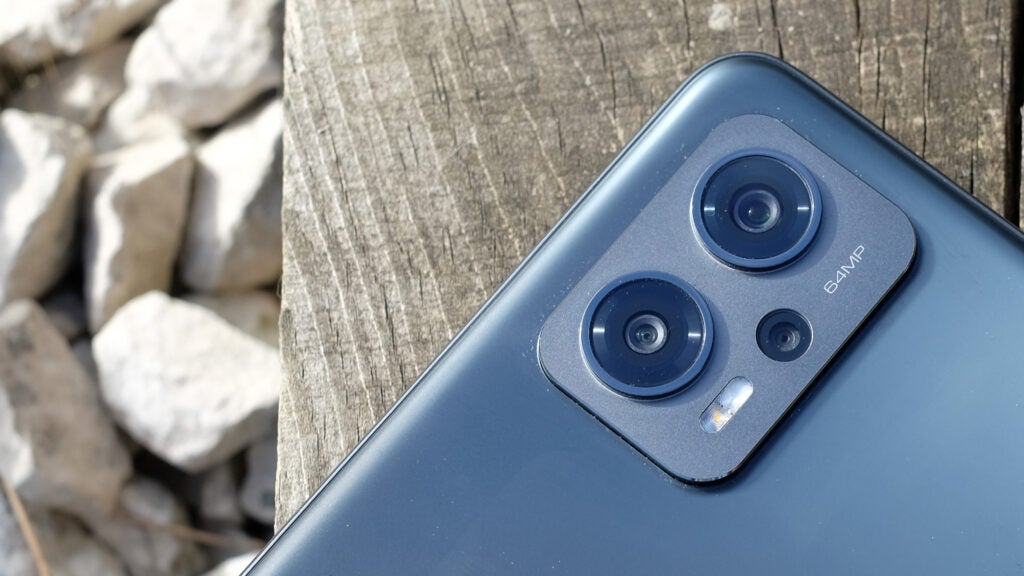
However, for a largely performance-driven phone, I’m fairly happy with the Poco X4 GT’s images. They don’t have the overenthusiastic colour of rivals such as the Realme GT Neo 3T. The Poco’s Auto HDR function, which had a major influence on the majority of photos I took, is solid and largely consistent. It means you can “fire and forget” about whether the Poco X4 GT will handle a scene properly.
I’ve found the Poco’s camera far more consistent than the Sony Xperia 10 IV‘s unit, for example – a phone that looks like it should have a better camera array on paper. The Poco also generally produces richer-looking images than the Moto G82 5G. I’ve had fun using this phone’s camera, and any issues are as troublesome considering the kind of phone this is.







However, it struggles with snapping night or low-light images. Fine natural detail often becomes fuzzy, and while useful, the dedicated Night mode doesn’t improve dynamic range or clarity nearly as much as the best.
The Poco X4 GT tends to favour brightness in images, which leads to slight overexposure in a some pictures. I’m not talking about clouds becoming blocks of white; but if you look closely enough at white buildings or someone wearing a white shirt shot on a sunny day, the highlights are likely to be overexposed.

The camera copes fine in night-time city scenes, where street lamps provide a reasonable amount of light; but truly dark scenes are handled in an uninspiring fashion. Don’t expect much from the 2x zoom mode, either. It appears to sharpen and manipulate contrast, and I actually prefer the look of a cropped section from a 1x image.


Its secondary cameras are also typical of the mid-range class to which the Poco X4 GT belongs. The ultra-wide has a lesser dynamic range than the main camera, resulting in unrealistic-looking colour gradients in skies, although I’m fairly impressed by the lens’ sharpness into the corners. A lot of ultra-wide cameras become extremely mushy at the corners, and this one doesn’t. Geometric distortion, yes; pure sludge, no.

There’s no redeeming the macro sensor, though. It’s a 2-megapixel camera, and 2-megapixel macros are never any good.
Video is a compromise in a similar vein. The Poco X4 GT can shoot videos at up to 4K resolution at 30 frames per second. You have the option of 60fps, too, but in most cases you’ll be better sticking to the default 1080p at 30 frames per second.
This is the level at which Poco’s electronic stabilisation becomes available, leading to a much more forgiving shooting experience.
The Poco X4 GT’s selfies are perfectly sound. The 16-megapixel camera always seems to spit out 16-megapixel, images, but does appear to make use of pixel binning in order to improve the quality of low-light images.
Battery Life
- Good fast-charging for the money
- Great battery life
- No wireless charging
The Poco X4 GT has a large 5080mAh battery, a capacity that’s just a touch higher than the 5000mAh norm at this level. Following a few weeks of use, I’ve found its real-life performance to be excellent, outlasting the category average to a greater extent than can be attributed to that extra 80mAh.
In particular, the Poco X4 GT’s battery drain with tasks such as streaming YouTube video has been impressively low – a top asset for an “entertainment” phone.
While I’ve used the Poco X4 GT too much to have seen it last anything like two days between charges, it’s certainly a trooper for long, heavy-use days when you need your phone to last.
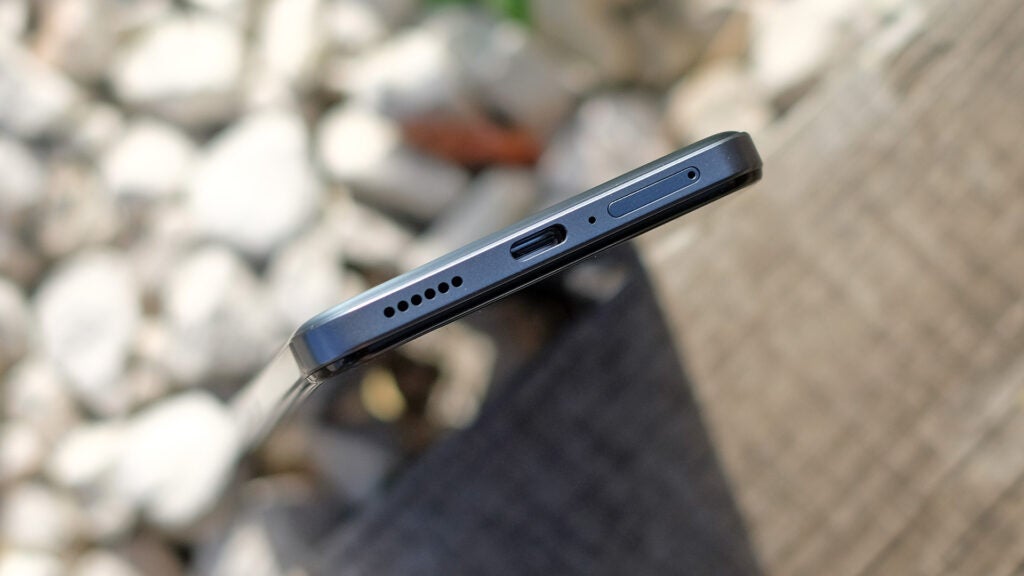
Despite having no concrete proof, I’m led to give the display panel and processor a lot of credit here. The Poco X4 GT lasted far longer than the Poco F4 in tests, making it more enjoyable to use even if it is a lower-end Android.
The Poco X4 GT offers 65W charging, which has become almost standard among higher-spec entry-level phones from Chinese companies such as Oppo, Xiaomi and OnePlus. A full charge takes a little over an hour – the device stopped drawing charge at 1hr 13mins, having hit 100% a few minutes earlier. Xiaomi says the phone can charge much more quickly, within 46 minutes. The charging speed I saw may have been affected by ambient temperatures since the phone was reviewed during a heatwave.
There’s no wireless charging here, but this is normal for a phone at the price.
Latest deals
Should you buy it?
Performance: This phone outperforms the vast majority of phones selling for similar money, and yet it suffers from no greater hardware compromises elsewhere than some far less power-focused alternatives.
Availability: The Poco X4 GT isn’t as widely available as some handsets from the Poco series, so that bargain price may be ruined by customs charges unless you’re careful. Low-light photography isn’t stunning, either.
How we test
We test every mobile phone we review thoroughly. We use industry standard tests to compare features properly and we use the phone as our main device over the review period. We’ll always tell you what we find and we never, ever, accept money to review a product.
Used as our main handset during test period
Camera tested in variety of situations with all modes
Tested with synthetic benchmarks and real world use
Final Thoughts
The Poco X4 GT is a great buy for those looking for a sensibly priced gaming and entertainment phone. Its processor is super-powerful, and both the long battery and tendency not to become too hot under pressure suggest its core components are efficient, too.
I don’t think you miss out much by not having an OLED screen here – seen in several notable rivals – because image quality and contrast are decent anyway.
The Poco X4 GT’s cameras are by no means class-leading, however, and some may find the design a bit bland or basic. Nevertheless, if you slip the phone into a case, the plastic build just won’t matter anymore.
FAQs
The Poco X4 GT doesn’t come with an official water-resistance rating.
There’s no microSD slot here.
There’s space for two SIM cards in the Poco X4 GT SIM tray.
Trusted Reviews test data
Sustainability
TrustedReviews’ holds the fact that global warming is not a myth as a core value and will continuously endeavor to help protect our planet from harm in its business practices.
As part of this mission, whenever we review a product we send the company a series of questions to help us gauge and make transparent the impact the device has on the environment.
We currently haven’t received answers to the questions on this product, but will update this page the moment we do. You can see a detailed breakdown of the questions we ask and why in our sustainability info page.
Jargon buster
5G
Offering faster download and upload speeds when compared to 4G. Great for game streaming and HDR video playback. Not supported everywhere yet and speeds vary wildly.
mAh
An abbreviation for milliampere-hour and a way to express the capacity of batteries, especially smaller ones in phones. In most cases the higher the mAh, the longer the battery will last but this isn’t always the case.
OLED
Organic Light Emitting Diode is panel technology that allows each individual pixel to produce light rather than relying on a backlight. This enables the screen to accurately display blacks by turning off the pixel, resulting in improved contrast compared to conventional LCD panels.
Verdict
The Poco X4 GT is a powerful, great-value, if you can find it at the right price. And while its camera array isn’t killer, it can outperform some similarly priced, less powerful Android handsets.
Pros
- Fantastic raw performance for the money
- Fast charging, good battery life
- Fairly loud speakers
- Rich colour, high refresh rate screen
Cons
- Feels a bit cheap without the bundled case
- Low-light camera performance isn’t great
Availability
- UKTBC
- USAunavailable
- EuropeRRP: €379
- Canadaunavailable
- Australiaunavailable
Introduction
The Poco X4 GT is an affordable performance phone, one of the best available at the price for raw performance. It’s powered by a MediaTek 8100 CPU, which can compete with the Qualcomm Snapdragon 8 Gen 1 in most respects.
This phone’s battery life is strong, too – handy, if you intend on making proper of the power on tap.
Build quality isn’t anything special, though, and its cameras – while solid enough – aren’t a match for those of the Pixel 6a. You also miss out on a couple of flashier extras, such as good water resistance and an in-screen fingerprint scanner.
However, the Poco X4 GT is made for a specific audience, to a limited budget, and the team behind it appear to have managed priorities well here. I also think it’s a stronger phone than the Poco F4 GT, which becomes hot more readily, suffers from more pronounced throttling, and costs more, too.
Price and Availability
The Poco X4 GT is very similar to the Xiaomi Note 11T Pro, a phone that only appears to be available officially in China.
At the time of review, the Poco X4 GT’s pricing is all over the place because it isn’t stocked in any of the retailers I’d usually reference. Nevertheless, this review is based on the idea that you can pick up the base 8GB/128GB model for around £289.99 (379 euro)
At this price the Poco X4 GT represents a great deal, one that makes me less disappointed by the slight issues with the phone’s build and camera. However, for the £400 I’ve spotted it from some places, it’s a far less appealing proposition, since it pushes the Poco up to phones such as the Pixel 6a, Nothing Phone (1) and OnePlus Nord 2T.
Design and Screen
- Fairly chunky at 8.9mm thick
- Plastic rear feels a little cheap
- Plain and inoffensive design
Xiaomi, the company behind the Poco series of devices, has churned out an awful lot of phones in the £250-£400 price bracket over the past couple of years. They tend to represent excellent value, but their priorities differ.
Build and style aren’t top priorities in the Poco X4 GT. This is an all-plastic handset, bar the glass that covers the screen and cameras, and the metal side buttons. Without the case, the Poco X4 GT feels like a budget phone. Plus, the straight-walled sides do little to hide the substantial size of this phone – at 8.9mm thick, it’s chunky.
Thankfully, you won’t ruin the look or feel of the Poco X4 GT by using the supplied case, so that’s what I did a couple of days after first setting it up.

That said, there’s a restrained plainness to the Poco X4 GT that I prefer to the bolder appearance of some other Poco phones and close rivals such as the Realme GT Neo 3T. The Poco’s plastic rear finish looks a bit like matte glass, and the camera housing is good-looking enough. Cute, almost.
The fingerprint scanner sits on the phone’s side, not in the screen. This position is usually perceived as a lower-end style – but, importantly, it works just as well. This scanner is built into the power button, but you don’t even need to depress the button itself to wake up the Poco X4 GT.
Other hardware features here are just what I want to see in an affordable, somewhat gaming-focused Android phone. The Poco X4 GT has loud stereo speakers, which just lack the lower-frequency power of the best, and there’s a headphone jack up top.
There’s no expandable memory, which is a shame. The Poco X4 GT offers 128GB of storage, which is common across many Android handsets of this style. A 256GB option is available, too, for slightly more money.
The Poco X5 GT has a 6.6-inch screen with an unusually high maximum refresh rate of 144Hz. Plenty of rivals have 120Hz screens, but 144Hz? This gives the phone a more gamer flavour; but in practice, it makes very little difference. However, you can set the display to 90Hz as well as 60Hz.
High refresh rate phones can typically be set to either 60Hz or their “high” setting. Getting a mid-level option is a nice addition.
Colour reproduction is excellent, delivering basically no sense that you’re losing out here by not having an OLED panel. By that I mean the most vivid setting is too saturated for my own tastes.

The fact that it’s LCD tech at play here becomes apparent in darker rooms, where you can make out the glow of the backlight in black parts of the display. It’s minor, though, and contrast is good for an LCD.
Brightness is one area I wish were slightly better. The Poco X4 GT can reach 490 nits normally, and in direct sunlight will ramp up to 570 nits. While this is okay, it’s far below the 770 nits of the Realme GT Neo 3T – that’s a phone that delivers unusually good outdoors visibility.
Supporting HDR content, the 2400 x 1080 pixel display looks sharp. You can get OLED panels for this money, but not in handsets with as much power as the Poco X4 GT. And, honestly, I don’t think you’re missing out on all that much with the LCD here.
Performance
- Some annoying MIUI quirks
- Excellent raw performance
- Great for gaming
The Poco X4 GT runs Android 12 with Xiaomi’s MIUI on top. This overwrites most of the big visual changes Google made in Android 12.
It remains a decent-looking interface, but like all of the recent Poco and Xiaomi phones I’ve used, there are some unwelcome changes to one element of navigation.

Performance is the main reason to buy the Poco X4 GT, since it’s powered by a MediaTek 8100 GPU. While not as big a name as the Qualcomm Snapdragon 8 Gen 1, for example, it performs at a comparable level – which is a great result for a phone at this price.
Compared to the Poco F4 with its Snapdragon 8 Gen 1, which scored 3687 (GeekBench 5) and 10,140 (3D Mark Wild Life test), the Poco X4 GT scored 3719 in Geekbench 5 and 5855 in 3DMark. That 3DMark score looks far better with the Snapdragon, but the Poco F4 suffers from far worse thermal throttling than the Poco X4 GT. Its actual performance lead is more like 30%, not almost 100%. At the price, the Poco X4 GT’s performance is excellent.
I tend to use Fortnite as an indicator of a phone’s gaming capabilities since it’s one of the platform’s more demanding games. This phone isn’t officially supported – a popup appears when you first run the phone.
That lack of official support means you can only run the game at its default “Medium” graphics. The menu also suggests 30fps is the maximum frame rate at which you can play. However, when I actually played a match the frame rate counter suggested it hit 100fps at points, generally hanging around the 60fps mark.
That’s significantly better than what you’ll achieve with most other phones around this price. It’s the sort of performance that made the early Poco phones such a hit with the tech fan crowd.
Camera
- Fun-to-use camera takes solid pics during the day
- Limited image quality at night
- Video isn’t very advanced
The Poco X4 GT has three rear cameras and one selfie camera – and there’s nothing terribly new to see here. The primary camera uses the 64-megapixel Samsung GW1, as seen in the Realme GT Neo 2.
The ultra-wide uses an 8-megapixel Samsung sensor, and the front camera a 16-megapixel Omnivision. These are all B-tier sensors; you probably shouldn’t buy a Poco X4 GT if camera quality is your top priority. A Pixel 6a or OnePlus Nord 2T would be better.

However, for a largely performance-driven phone, I’m fairly happy with the Poco X4 GT’s images. They don’t have the overenthusiastic colour of rivals such as the Realme GT Neo 3T. The Poco’s Auto HDR function, which had a major influence on the majority of photos I took, is solid and largely consistent. It means you can “fire and forget” about whether the Poco X4 GT will handle a scene properly.
I’ve found the Poco’s camera far more consistent than the Sony Xperia 10 IV‘s unit, for example – a phone that looks like it should have a better camera array on paper. The Poco also generally produces richer-looking images than the Moto G82 5G. I’ve had fun using this phone’s camera, and any issues are as troublesome considering the kind of phone this is.







However, it struggles with snapping night or low-light images. Fine natural detail often becomes fuzzy, and while useful, the dedicated Night mode doesn’t improve dynamic range or clarity nearly as much as the best.
The Poco X4 GT tends to favour brightness in images, which leads to slight overexposure in a some pictures. I’m not talking about clouds becoming blocks of white; but if you look closely enough at white buildings or someone wearing a white shirt shot on a sunny day, the highlights are likely to be overexposed.

The camera copes fine in night-time city scenes, where street lamps provide a reasonable amount of light; but truly dark scenes are handled in an uninspiring fashion. Don’t expect much from the 2x zoom mode, either. It appears to sharpen and manipulate contrast, and I actually prefer the look of a cropped section from a 1x image.


Its secondary cameras are also typical of the mid-range class to which the Poco X4 GT belongs. The ultra-wide has a lesser dynamic range than the main camera, resulting in unrealistic-looking colour gradients in skies, although I’m fairly impressed by the lens’ sharpness into the corners. A lot of ultra-wide cameras become extremely mushy at the corners, and this one doesn’t. Geometric distortion, yes; pure sludge, no.

There’s no redeeming the macro sensor, though. It’s a 2-megapixel camera, and 2-megapixel macros are never any good.
Video is a compromise in a similar vein. The Poco X4 GT can shoot videos at up to 4K resolution at 30 frames per second. You have the option of 60fps, too, but in most cases you’ll be better sticking to the default 1080p at 30 frames per second.
This is the level at which Poco’s electronic stabilisation becomes available, leading to a much more forgiving shooting experience.
The Poco X4 GT’s selfies are perfectly sound. The 16-megapixel camera always seems to spit out 16-megapixel, images, but does appear to make use of pixel binning in order to improve the quality of low-light images.
Battery Life
- Good fast-charging for the money
- Great battery life
- No wireless charging
The Poco X4 GT has a large 5080mAh battery, a capacity that’s just a touch higher than the 5000mAh norm at this level. Following a few weeks of use, I’ve found its real-life performance to be excellent, outlasting the category average to a greater extent than can be attributed to that extra 80mAh.
In particular, the Poco X4 GT’s battery drain with tasks such as streaming YouTube video has been impressively low – a top asset for an “entertainment” phone.
While I’ve used the Poco X4 GT too much to have seen it last anything like two days between charges, it’s certainly a trooper for long, heavy-use days when you need your phone to last.

Despite having no concrete proof, I’m led to give the display panel and processor a lot of credit here. The Poco X4 GT lasted far longer than the Poco F4 in tests, making it more enjoyable to use even if it is a lower-end Android.
The Poco X4 GT offers 65W charging, which has become almost standard among higher-spec entry-level phones from Chinese companies such as Oppo, Xiaomi and OnePlus. A full charge takes a little over an hour – the device stopped drawing charge at 1hr 13mins, having hit 100% a few minutes earlier. Xiaomi says the phone can charge much more quickly, within 46 minutes. The charging speed I saw may have been affected by ambient temperatures since the phone was reviewed during a heatwave.
There’s no wireless charging here, but this is normal for a phone at the price.
Latest deals
Should you buy it?
Performance: This phone outperforms the vast majority of phones selling for similar money, and yet it suffers from no greater hardware compromises elsewhere than some far less power-focused alternatives.
Availability: The Poco X4 GT isn’t as widely available as some handsets from the Poco series, so that bargain price may be ruined by customs charges unless you’re careful. Low-light photography isn’t stunning, either.
How we test
We test every mobile phone we review thoroughly. We use industry standard tests to compare features properly and we use the phone as our main device over the review period. We’ll always tell you what we find and we never, ever, accept money to review a product.
Used as our main handset during test period
Camera tested in variety of situations with all modes
Tested with synthetic benchmarks and real world use
Final Thoughts
The Poco X4 GT is a great buy for those looking for a sensibly priced gaming and entertainment phone. Its processor is super-powerful, and both the long battery and tendency not to become too hot under pressure suggest its core components are efficient, too.
I don’t think you miss out much by not having an OLED screen here – seen in several notable rivals – because image quality and contrast are decent anyway.
The Poco X4 GT’s cameras are by no means class-leading, however, and some may find the design a bit bland or basic. Nevertheless, if you slip the phone into a case, the plastic build just won’t matter anymore.
FAQs
The Poco X4 GT doesn’t come with an official water-resistance rating.
There’s no microSD slot here.
There’s space for two SIM cards in the Poco X4 GT SIM tray.
Trusted Reviews test data
Sustainability
TrustedReviews’ holds the fact that global warming is not a myth as a core value and will continuously endeavor to help protect our planet from harm in its business practices.
As part of this mission, whenever we review a product we send the company a series of questions to help us gauge and make transparent the impact the device has on the environment.
We currently haven’t received answers to the questions on this product, but will update this page the moment we do. You can see a detailed breakdown of the questions we ask and why in our sustainability info page.
Jargon buster
5G
Offering faster download and upload speeds when compared to 4G. Great for game streaming and HDR video playback. Not supported everywhere yet and speeds vary wildly.
mAh
An abbreviation for milliampere-hour and a way to express the capacity of batteries, especially smaller ones in phones. In most cases the higher the mAh, the longer the battery will last but this isn’t always the case.
OLED
Organic Light Emitting Diode is panel technology that allows each individual pixel to produce light rather than relying on a backlight. This enables the screen to accurately display blacks by turning off the pixel, resulting in improved contrast compared to conventional LCD panels.


















